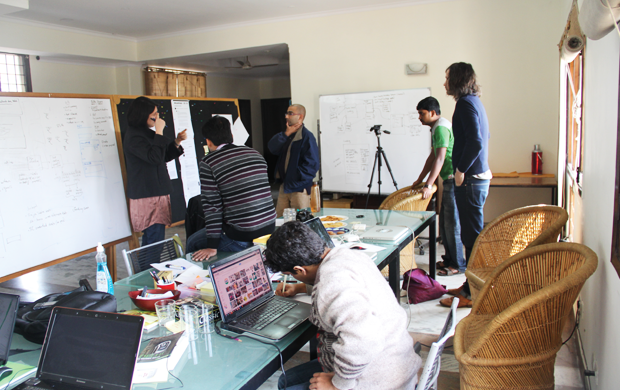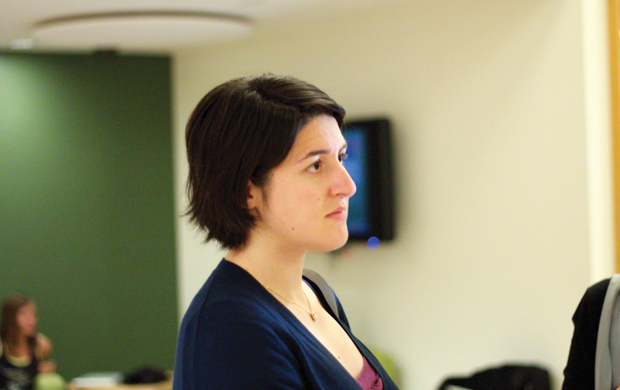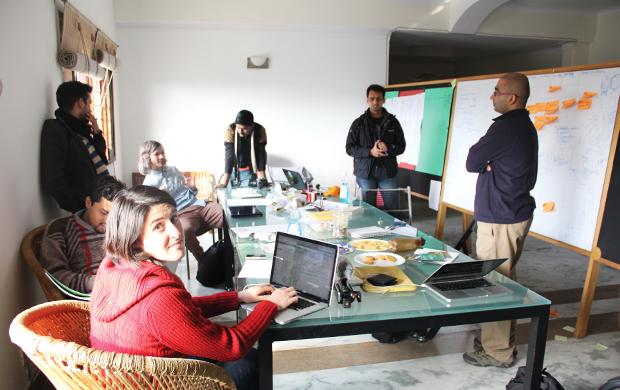As part of our effort to give you a glimpse into UnBox, we feature posts from UnBox participants past and present, who talk about their unique insight into what it means to be part of the festival. In this post, Lilly Irani, from the ‘Hacking for Governance’ fellowship in 2012 gives us her take on the experience.
Conducted in partnership with Azri Solutions and Parliamentary Research Services, the Hacking for Governance fellowship was an effort to encourage and enable transparency in lawmaking. Working over ten days, a team of developers, designers and law and government enthusiasts, with mentorship from members of the Azri team deployed a mobile / web platform to facilitate collaborative lawmaking and bill drafting.
UnBox inspires optimism and a willingness to experiment. In this spirit, I applied to the 2012 Fellowship on participatory governance. I arrived in Delhi to spend a week with many people I had never met, working on something as of yet undecided. Any sane project manager would run away. But this is a hackathon, and hackathons are meant to be a little bit ill-advised (sleep little, work a lot?), daring, and driven. We had a studio, we had laptops, and we had food and water nearby. PRS was advising us on parliamentary matters. What we didn’t have was a shared background. What we didn’t have was time. At the UnBox Festival, the hackathon seemed to be as much a test of organizational possibility as it was about making a demo. We were driving towards a demo. Nirat, our convener, had arranged for us to show off the demo in the UnBox gallery during the conference. Wielding laptops and prototypes, we could tell UnBox attendees what we had accomplished together and what we had learned.
I learned more from what we were not able to hack than what we could.
As we sat together in the studio, we cribbed about corruption scandals. We told stories about websites we liked, about petitions that annoyed us. We told stories about political processes and tried to imagine how those stories could have gone differently. Our goal was to get more Indians involved in the bill drafting process. As we spoke, we learned that we had really different ideas of what that mission meant.


Some of our stories were about laws as code—code drafted by ministers, code that determined people’s incentives and behavior. The problem with the law in these stories were problems of logic: loopholes, underspecified penalties, ambiguous logic that left room for on the ground manipulation. To these problems, our group discussion veered towards solutions of drawing in expert Indians to read and comment on the law and incentive-driven competitions to motivate people to find the logical holes. With these ideas, we dreamt up ideas analogous to Wikipedia or open-source programming collaborations as ways of fixing legal texts.
A second series of stories was about laws as rules that politicians, police officers, and everyday Indians use however they can to further their own ends. A legal anthropologist gave us the example of the Forest Rights Act of 2006, which had been implemented with very different results in different Indian states, based on local power contests and trans-national development schemes.
We couldn’t control how people would interpret the law, but perhaps we could get people involved in voicing their issues, and perhaps we could help those people get heard. The people least represented in the law drafting process, we decided, were poorer Indians without access to English (the language of Indian law) or expert policy networks. Helping them in a hackathon, however, threw up surprising challenges.
Only 10% of Indians have access to the web. Yet the hackathon as an event is based on the idea that there are lots of tools for programming and building technologies already out there, so you can build things by stitching existing code together quickly. To reach the majority of the populace, however, we would need to build relationships not through computer software but through working with existing activist and NGO networks. We’d have to get out of the studio, to have conversations, to build alliances, and to find out how we could help legal activists with deep rural networks. Building new relationships for these hackers, mostly with experience in tech industries, would be a slow process. While we could dream it in a week, we definitely couldn’t build it in a week.What can be hacked is software, but what can’t be hacked as easily is human relationships. And sometimes building solidarity and relationships is the most important part of making social change. Some things can’t be rushed.

Lilly Irani
UnBox Fellow 2012

